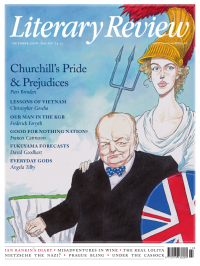Tom Fort
Not Many Fish in the Sea
Silver Shoals: Five Fish That Made Britain
By Charles Rangeley-Wilson
Chatto & Windus 359pp £18.99
As often as not, the subtitles now obligatory for all non-fiction books seem calculated as much to irritate through hyperbole, absurdity or prolixity as to inform a potential buyer what the book is about and whether it is worth the trouble of reading. But with Charles Rangeley-Wilson’s Silver Shoals, I am not so much irritated as baffled. I get the five fish: cod, herring, salmon, eel and carp. But the five fish ‘that made Britain’? What on earth does that mean? I suspect the hand of some keen publicity person trying to give this literate and passionate narrative some extra oomph. It doesn’t need it; it carries enough conviction on its own.
Of its two main themes, one – the inability of the human race to exploit a natural resource without wrecking it – is familiar enough. The other is more original. It concerns the cultural loss that inevitably occurs when the way of life sustained by that exploitation withers and dies. The story of the collapse of the North Sea herring industry has been told many times but retains its power to shock. In 1913 more than two thousand steam vessels were plundering the vast shoals off the east coast of England. No one believed that such abundance could be exhausted, until it happened. As Rangeley-Wilson puts it, ‘A vibrant industry that shaped an entire coastal community collided fatally with history, greed, mismanagement, politics and environmental change.’
Now, like the cod, the herring has staged something of a recovery. But Rangeley-Wilson is hard-pressed to find anyone to take him out to fish for them. People lost the herring habit: they don’t eat them any more. Jim, a fisherman who nets them just for the fun

Sign Up to our newsletter
Receive free articles, highlights from the archive, news, details of prizes, and much more.@Lit_Review
Follow Literary Review on Twitter
Twitter Feed
Though Jean-Michel Basquiat was a sensation in his lifetime, it was thirty years after his death that one of his pieces fetched a record price of $110.5 million.
Stephen Smith explores the artist's starry afterlife.
Stephen Smith - Paint Fast, Die Young
Stephen Smith: Paint Fast, Die Young - Jean-Michel Basquiat: The Making of an Icon by Doug Woodham
literaryreview.co.uk
15th-century news transmission was a slow business, reliant on horses and ships. As the centuries passed, though, mass newspapers and faster transport sped things up.
John Adamson examines how this evolution changed Europe.
John Adamson - Hold the Front Page
John Adamson: Hold the Front Page - The Great Exchange: Making the News in Early Modern Europe by Joad Raymond Wren
literaryreview.co.uk
"Every page of "Killing the Dead" bursts with fresh insights and deliciously gory details. And, like all the best vampires, it’ll come back to haunt you long after you think you’re done."
✍️My review of John Blair's new book for @Lit_Review
Alexander Lee - Dead Men Walking
Alexander Lee: Dead Men Walking - Killing the Dead: Vampire Epidemics from Mesopotamia to the New World by John Blair
literaryreview.co.uk